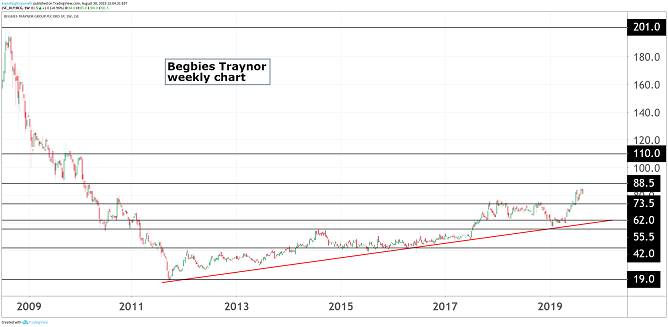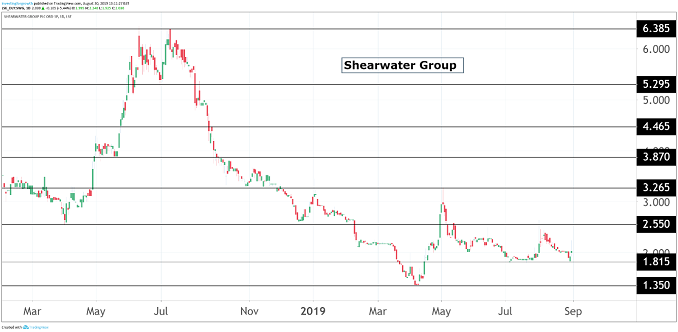These small-caps could thrive after Brexit
There will be winners in the event of a no-deal Brexit. Our AIM expert identifies possible candidates.
30th August 2019 15:49
by Andrew Hore from interactive investor
There will be winners in the event of a no-deal Brexit. Our AIM expert identifies possible candidates.

Brexit seems as up in the air as it has ever been, and it creates continuing uncertainty for investors and share prices.
No individual outcome is guaranteed, although a no-deal Brexit is looking more likely than it has done for some time, and most share prices have taken a hit. Smaller companies appear to have been harder hit than their larger peers, which is not wholly unsurprising.
I have written in the past about companies with overseas earnings that are benefiting from the decline in sterling and these are looking increasingly attractive.
It is not easy to identify AIM companies that will do well whatever happens. For example, storage and distribution companies might seem to be set to benefit from the build up of stock ahead of the exit from the European Union (EU), but it is not that simple.
NWF (LSE:NWF) has a food distribution business that stores products on behalf of consumer brands and transports them to retailers. This is a tight-run operation with efficiency being the key to maximising profitability.
Relationships with customers are also important. So, when they want additional short-term storage NWF will try to help. This happened prior to the previous Brexit deadline at the end of March. This entailed obtaining overflow warehousing outside the main Wardle warehouse.
That generated additional revenues, but little in the way of profit. October is a busy time for this business because of Halloween, then Christmas products being distributed to the shops. It will be difficult to provide much space for Brexit-related storage.
I recently wrote about engineering services provider Renew Holdings (LSE:RNWH), pointing out that it generates most of its revenues from regular, ongoing maintenance spending in sectors such as water, rail and nuclear.
- Six AIM 100 stocks worthy of attention
- Like AIM and small-company shares? Check out ii’s Super 60 recommended funds
This spending will need to continue, whereas larger projects, such as HS2, could be stopped or delayed after Brexit. The Renew share price has drifted down to 389p since the previous article, so the shares are trading on less than 10 times prospective earnings.
When Brexit is good for business
The pessimists may be attracted by insolvency practitioner Begbies Traynor (LSE:BEG), as the continued uncertainty hits corporate confidence and could lead to more companies getting into financial difficulties. Seriously, though, the number of insolvencies has been rising.
The company's Red Flag Alert report for the second quarter of 2019 showed 484,000 businesses in significant financial distress – 14% of all active businesses. Those in critical distress rose by 5%. Property, leisure and financials businesses are hardest hit. Interestingly, there was a 12% increase to 5,243 in the number of online retail businesses in distress over a 12-month period.
Insolvencies have been rising for the first time in nearly a decade. Begbies has been profitable and cash generative through a period when demand has been at unusually low levels. It has the capacity to take on more work and higher utilisation levels will lead to higher margins and profit levels. There is a property services division that has insolvency-related business, but also does non-insolvency related work.

Source: TradingView Past performance is not a guide to future performance
Begbies raised £8.3 million at 75p a share in order to make add-on acquisitions for the business.
Management has a good acquisition record. Before any acquisitions, this year's pre-tax profit is expected to improve from £7.1 million to £8.5 million – a prospective multiple of less than 15 at the current share price of 80.5p. Profit might grow faster if there were financial problems following a no-deal exit from the EU.
Avoiding Brexit problems on AIM
The best way to avoid Brexit-related investment disappointments is to choose businesses that are involved in sectors or products where success is not dependent on any relationship with the EU.
For example, Shearwater Group (LSE:SWG) provides cyber and compliance software and services. More than one-third of its revenues are recurring and the markets it addresses are set to grow at a compound annual growth rate of more than 10% over the coming years. Cyber criminals do not care about any EU deal.
Shearwater is a consolidator in the cyber sector, and it has built up a range of software and services. More can be added on. It has a mixed record, but the new management team has put Shearwater in a much better position to prosper.
The company has a predominantly UK cost base and an international business, but it is involved in market niches and has a strong customer base. The decline in the pound might appear to be a problem, but management is confident that it will not stop it winning new international contracts.

Source: TradingView Past performance is not a guide to future performance
Shearwater is made up of five separate acquisitions and it is only in recent months that management has got to grips with integrating those businesses. The initial results in the form of cost savings from centralising back office functions and from cross-selling are positive.
This means that management can focus on supplementing the organic growth with further acquisitions, with a structure that can efficiently integrate any further businesses.
New joint broker Berenberg believes that Shearwater can make a £3 million pre-tax profit in the year to March 2020. Management understands that it needs to achieve forecasts if it wants to do earnings enhancing deals that are financed by share issues and the first-quarter trading statement is encouraging.
At 1.925p, the shares are trading on around 16 times prospective earnings and that could fall to nearer 11 next year. Importantly, the business is cash generative. Once investors notice the improving performance they will be attracted by the underlying growth.
There are other companies where there is potential for a one-off step change in their business.
An AIM share up 480% in 2019
The share price of Shield Therapeutics (LSE:STX) has soared since it gained FDA approval for iron deficiency treatment Feraccru. The approval was broader than anticipated and this has doubled the potential market.
Iron is critical for red blood cells, which transport oxygen around the body. Low iron levels cause defective production of red blood cells and that leads to anaemia. Feraccru is more tolerable than other oral products and it can be used instead of the more costly IV treatment.
Talking to management at the time of its recent results it was clear that they are confident that they can sign up a commercial partner in the US – a market that is worth around $1 billion a year. They have a shortlist and believe the partner can be secured before the end of 2019. That will provide a further boost for the share price, currently 172.5p, particularly if the competition enables an attractive deal to be struck.
Shield should have enough cash until the middle of 2020. A US deal should bring with it an upfront payment to make the cash reserves stretch further. There should also be growing royalties from the European and Australasian distributor Norgine that will move Shield towards profit.
Caribbean oil
Resources companies outside of Europe are not hit by any EU uncertainty other than how it affects the confidence and strategy of investors. The dollar-based revenues of oil and gas companies are even worth more to UK investors after the fall of the pound.
Touchstone Exploration (LSE:TXP) has cash generative oil and gas production that more than underpins its valuation. There is significant upside from exploration drilling in an area that has already been explored six decades ago. Of course, exploration is risky, so there are no guarantees, but the downside should be limited.
Drilling has commenced on Coho-1 in the Ortoire exploration area and the target is gas. This is the first of at least four planned wells. These wells are near to previous wells drilled by Shell in the 1950s which showed signs of hydrocarbons.
Touchstone has an 80% working interest in Ortoire and it will fund the full cost on behalf of Heritage Petroleum, which owns the other 20%. The first two wells could cost more than $6 million.
The results of the first well could be available in September. Once drilling is completed the drilling rig will be moved to the second drill site. This means that Touchstone offers some hope for investors in a potentially depressing time. Of course, success is not guaranteed.
Broker Shore Capital believes that the exploration prospects could add 60p a share to its core valuation of existing assets of 26p a share. The current share price is 14.375p.
Cash will be required. Net debt is expected to rise to $11.5 million at the end of 2019 and then increase further to $16.2 million the following year - even after generating more than $7 million in operating cash.
Effectively, Touchstone will probably need to raise more cash through a share issue. Successful exploration would make that easier and reduce dilution.
Andrew Hore is a freelance contributor and not a direct employee of interactive investor.
These articles are provided for information purposes only. Occasionally, an opinion about whether to buy or sell a specific investment may be provided by third parties. The content is not intended to be a personal recommendation to buy or sell any financial instrument or product, or to adopt any investment strategy as it is not provided based on an assessment of your investing knowledge and experience, your financial situation or your investment objectives. The value of your investments, and the income derived from them, may go down as well as up. You may not get back all the money that you invest. The investments referred to in this article may not be suitable for all investors, and if in doubt, an investor should seek advice from a qualified investment adviser.
Full performance can be found on the company or index summary page on the interactive investor website. Simply click on the company's or index name highlighted in the article.
Disclosure
We use a combination of fundamental and technical analysis in forming our view as to the valuation and prospects of an investment. Where relevant we have set out those particular matters we think are important in the above article, but further detail can be found here.
Please note that our article on this investment should not be considered to be a regular publication.
Details of all recommendations issued by ii during the previous 12-month period can be found here.
ii adheres to a strict code of conduct. Contributors may hold shares or have other interests in companies included in these portfolios, which could create a conflict of interests. Contributors intending to write about any financial instruments in which they have an interest are required to disclose such interest to ii and in the article itself. ii will at all times consider whether such interest impairs the objectivity of the recommendation.
In addition, individuals involved in the production of investment articles are subject to a personal account dealing restriction, which prevents them from placing a transaction in the specified instrument(s) for a period before and for five working days after such publication. This is to avoid personal interests conflicting with the interests of the recipients of those investment articles.